Airlines, Airports and Airliners 10 to 16 Oct 2022
Compiled by Willie Bodenstein
Google Banner Ad
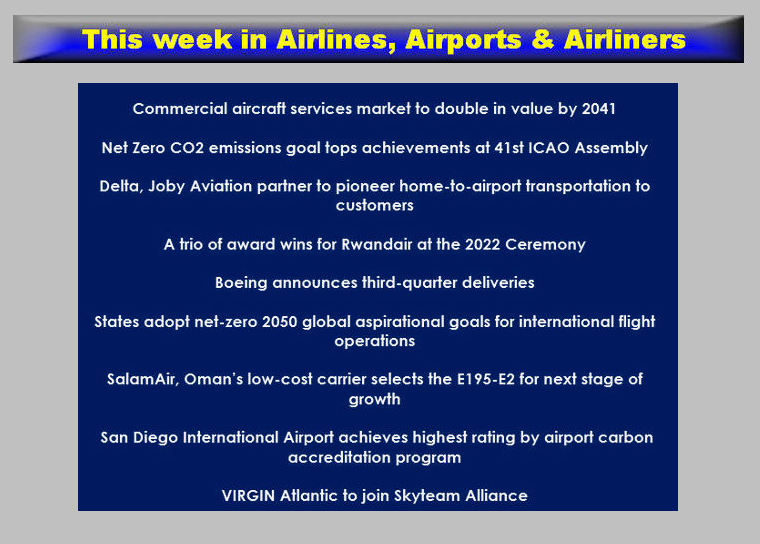
COMMERCIAL AIRCRAFT SERVICES MARKET TO DOUBLE IN VALUE BY 2041

Airbus expects the services market to recover to pre pandemic levels in 2023 and to double in value over the next 20 years - from $95bn today to over $230bn in 2041, according to its latest Global Services Forecast (GSF). As a result, the number of people working in aviation services, keeping the world's fleets flying on a daily basis, is set to increase by a further two million.
"Every day millions of people in services, hidden champions behind the scenes, keep our global fleet of aircraft flying. Alone the number of pilots, cabin crews and maintenance specialists is set to grow by a further two million by 2041", says Philippe Mhun, Airbus EVP Programmes and Services. "Accelerated digitalisation of operations and maintenance as well as a higher proportion of latest generation aircraft in service will lead to a massive requirement for new skills and job creation, leveraging new tools and ways of working in order to further increase our sector's efficiency, reduce fuel consumption and emissions."
A compounded annual growth rate of 3.7%, will lead to a doubling in the value of the services market in the next two decades with a bigger than ever demand for highly skilled labour: 585,000 new pilots, 640,000 new technicians and 875,000 new cabin crews.
As operators focus more on their core business, services to improve aircraft availability and efficiency will increasingly be outsourced, boosting the market for those providers. These services will be driven by sustainability and enabled by digitalisation, connectivity and innovation, to maximise efficiency in support of CO2 net zero ambitions.
Mhun concludes: "The GSF confirms our strategy and we are ready. Customer experience is our priority. Customer value will be underpinned by excellence in sustainable services and new energy transition, fully leveraging our Airbus Skywise digital capabilities. Aviation services will remain one of the most advanced and international industries, keeping our customers and society at large at the heart of our operations."
Google Banner Ad
NET ZERO CO2 EMISSIONS GOAL TOPS ACHIEVEMENTS AT 41ST ICAO ASSEMBLY
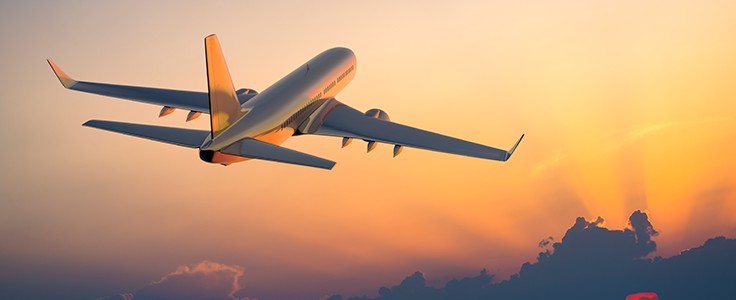
The International Air Transport Association (IATA) is strongly encouraged by the adoption of a Long Term Aspirational Goal (LTAG) to achieve net zero CO2 emissions by 2050 at the 41st Assembly of the International Civil Aviation Organization (ICAO).
This important step forward by states aligns with both the objectives of the Paris Agreement and the net zero CO2 emissions by the 2050 resolution agreed by airlines at the 77th IATA Annual General Meeting in October 2021.
"The significance of the LTAG agreement cannot be under-estimated. The aviation industry's commitment to achieve net zero CO2 emissions by 2050 requires supportive government policies. Now that governments and industry are both focused on net zero by 2050, we expect much stronger policy initiatives in key areas of decarbonisation such as incentivising the production capacity of Sustainable Aviation Fuels (SAF). The global determination to decarbonise aviation that underpins this agreement must follow the delegates home and lead to practical policy actions enabling all states to support the industry in the rapid progress that it is determined to make," said Willie Walsh, IATA's Director General.
The decision on a long-term goal at ICAO comes after intense negotiations bridging the different levels of development across the world. There was overwhelming support at the ICAO Assembly for the goal.
The Assembly also reinforced its commitment to the Carbon Offsetting and Reduction Scheme for International Aviation (CORSIA) and increased its ambition by agreeing to stabilise emissions of international aviation at 85% of the 2019 level. In agreeing this, many governments emphasised CORSIA's role as the only economic measure applied to manage the carbon footprint of international aviation.
"The Assembly's agreement strengthens CORSIA. The lower baseline will place a significantly greater cost burden on airlines. So, it is more critical than ever those governments do not chip away at the cement which bonds CORSIA as the only economic measure to manage the carbon footprint of international aviation. States must now honour, support and defend CORSIA against any proliferation of economic measures. These will only undermine CORSIA and the collective effort to decarbonise aviation," said Walsh.
Sustainable Aviation Fuel (SAF)
Industry expects SAF to play the largest role in decarbonising aviation. IATA estimates that perhaps 65% of the mitigation needed for net zero emissions in 2050 will come from SAF. While the industry purchased all one hundred million litres of SAF available in 2021, the supply remains limited and the price far higher than conventional jet fuel.
"With LTAG in mind, state efforts should now be focused on ways to incentivise an increase in SAF production capacity and thereby reduce its cost. The tremendous progress made in many economies on the transition of electricity production to green sources such as solar power and wind is a shining example of what can be achieved with the right government policies, particularly production incentives," said Walsh.
Google Block Ad
DELTA, JOBY AVIATION PARTNER TO PIONEER HOME-TO-AIRPORT TRANSPORTATION TO CUSTOMERS

Delta Air Lines (NYSE: DAL) is once again deepening its commitment to transform the future of travel: the airline is embarking on a multi-year, multi-market commercial and operational partnership with Joby Aviation, Inc. (NYSE: JOBY), to deliver transformational, sustainable home-to-airport transportation service to Delta customers, beginning in New York and Los Angeles.
As part of the first-of-its-kind arrangement, the companies will work together to integrate a Joby-operated service into Delta's customer-facing channels, providing customers who travel with Delta through New York and Los Angeles the opportunity to reserve a seat for seamless, zero-operating-emission, short-range journeys to and from city airports when booking Delta travel.
Delta has made an upfront equity investment of $60 million in Joby, with the opportunity to expand the total investment up to $200 million as the partners achieve substantive milestones on the development and delivery of the service. The partners will work together to create a differentiated, premium experience for Delta customers featuring seamless booking, simplified transit and greater time savings. This will run alongside Joby's standard airport service in priority markets. The partnership will be mutually exclusive across the U.S. and U.K. for five years following a commercial launch, with the potential to extend that period.
"Delta always looks forward and embraces opportunities to lead the future, and we've found in Joby a partner that shares our pioneering spirit and commitment to delivering innovative, seamless experiences that are better for our customers, their journeys, and our world," said Delta CEO Ed Bastian. "This is a ground breaking opportunity for Delta to deliver a time-saving, uniquely premium home-to-airport solution for customers in key markets we've been investing and innovating in for many years."
Delta has long made strategic investments in unique commercial partnerships that deliver value and drive growth for individual businesses. From investments in companies such as CLEAR and Wheels Up to a worldwide network of alliance partners Delta's partnerships have played a key role in Delta's efforts to transform the travel experience.
"We share Delta's unwavering commitment to delivering seamless and sustainable journeys to customers," said Joby Founder and CEO JoeBen Bevirt. "Their history of innovation, along with their vast operational expertise and leadership on climate change, make them incredible partners for Joby and it's an honour to be working alongside them."
Joby's aircraft is designed to fly fast, quiet and sustainable trips in and around cities. The aircraft has flown more than 1,000 test flights, demonstrating its range, speed, altitude and low noise profile. The company was the first eVTOL company to be granted a G-1 (Stage 4) Certification Basis for its aircraft by the FAA and recently received its Part 135 Air Carrier Certification.
"Delta is differentiating and amplifying the customer experience with premium products, choices and solutions across the journey," said Allison Ausband, Delta's E.V.P. and Chief Customer Experience Officer. "Addressing what matters most to our customers is foundational to our focus and our work with Joby is the latest in a series of ways we're making the experience of travel more seamless, enjoyable and wait-free."
This year alone, Delta unveiled multi-billion-dollar terminal transformations at both New York's LaGuardia Airport and Los Angeles International, further cementing its commitment to those hubs and creating a more efficient and seamless experience for customers from the moment they arrive at the airport. The airline also continues to invest in digital identity technology in these and other airports, which allows customers to move through the airport using facial matching, eliminating the need to show a boarding pass or government ID and thereby expediting their journeys. Delta also recently debuted its Parallel Reality experience at Detroit Metropolitan Airport, bringing to life a technology that was first previewed at CES in 2020.
Google Block Ad
A TRIO OF AWARD WINS FOR RWANDAIR AT THE 2022 CEREMONY
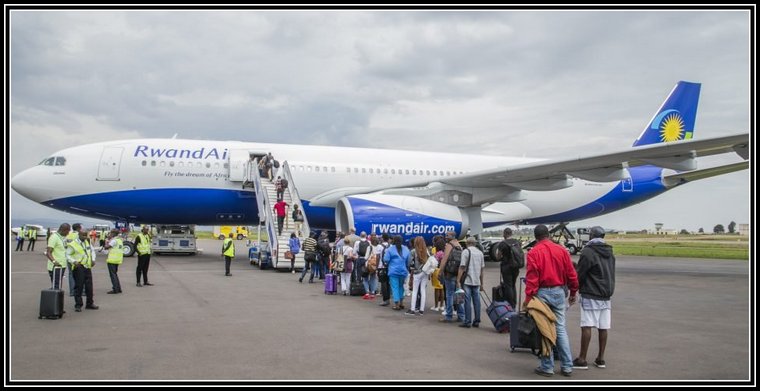
RwandAir won the award for 'Best Airline Staff in Africa' at Skytrax's 2022 World Airline Awards. The Rwandan flag carrier has taken home the prestigious title for a second successive year in recognition of its excellent customer service. RwandAir was ranked first out of ten other African airlines all contending for the top spot.
The carrier's staffs - both on the ground and in the air - were praised by airline customers for their excellent service. The African carrier also won the award for 'Best Cabin Crew in Africa' and 'Best Airline Cabin Cleanliness in Africa', completing the trio.
RwandAir CEO, Yvonne Makolo, said: "We are all very proud to have had our staff recognised for their dedication by Skytrax. "We are delighted to know that our customers choose to fly with us and distinguish the level of quality of our service."
The World Airline Awards began in 1999 when Skytrax launched its first global, annual airline customer satisfaction survey. They are referred to as the Oscars of the aviation industry.
Based in Kigali, RwandAir is one of Africa's most ambitious airlines with a reputation for delivering a premium service to all its customers.
RwandAir currently operates to 28 destinations across 22 countries throughout Africa, Europe, the Middle East, and Asia.
BOEING ANNOUNCES THIRD-QUARTER DELIVERIES

The Boeing Company [NYSE: BA] announced major program deliveries across its commercial and defence operations for the third quarter of 2022. Major program deliveries during the third quarter were as follows:
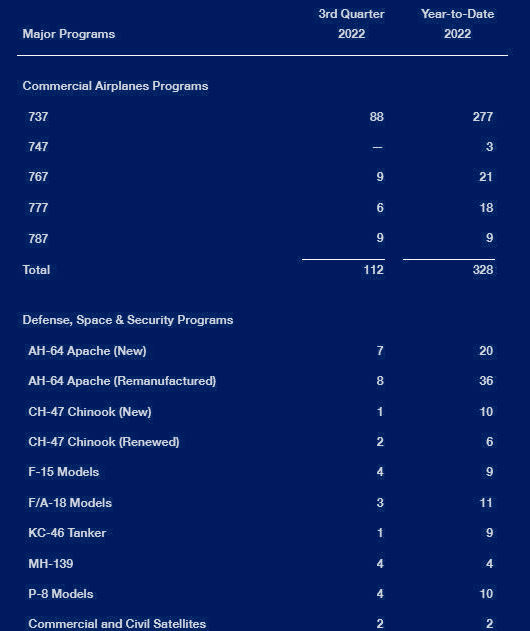
The company will provide detailed third quarter financial results on October 26.
Google Banner Ad
STATES ADOPT NET-ZERO 2050 GLOBAL ASPIRATIONAL GOALS FOR INTERNATIONAL FLIGHT OPERATIONS
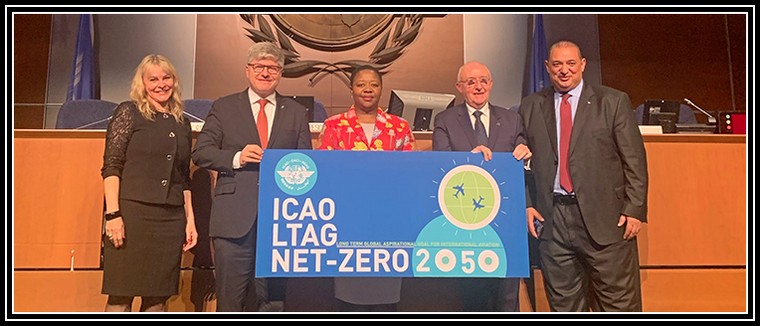
Culminating 2 weeks of intensive diplomacy by over 2500 delegates from 184 States and 57 organisations at the 41st ICAO Assembly, ICAO Member States adopted a collective long-term global aspirational goal (LTAG) of net-zero carbon emissions by 2050.
The achievement of the LTAG will rely on the combined effect of multiple CO2 emissions reduction measures, including the accelerated adoption of new and innovative aircraft technologies, streamlined flight operations and the increased production and deployment of sustainable aviation fuels (SAF).
"States' adoption of this new long term goal for decarbonised air transport, following the similar commitments from industry groups, will contribute importantly to the green innovation and implementation momentum which must be accelerated over the coming decades to ultimately achieve emissions free powered flight," stressed the President of the ICAO Council Mr. Salvatore Sciacchitano.
"Countries have achieved some tremendous and very important diplomatic progress at this event and on topics of crucial importance to the future sustainability of our planet and the air transport system which serves and connects its populations," commented ICAO Secretary General Juan Carlos Salazar.
States at the ICAO Assembly also collectively underscored the importance of viable financing and investment support to the new CO2 emissions goal's attainment and fully supported the new ICAO Assistance, Capacity-building and Training for Sustainable Aviation Fuels (ACT-SAF) programme to accelerate the availability and use of SAF - requesting in addition that a third ICAO Conference on Aviation and Alternative Fuels be convened in 2023.
Other notable environmental developments at the 41st ICAO Assembly included the completion of the first periodic review of the Carbon Offsetting and Reduction Scheme for International Aviation (CORSIA). Countries agreed on a new CORSIA baseline from 2024 onwards, defined as 85% of CO2 emissions in 2019, and on revised percentages for the sectoral and individual growth factors to be used for the calculation of offsetting requirements from 2030 onwards.
The historic outcome of the Assembly were acknowledged to be thanks to the outstanding leadership and excellent chairwomanship of the meeting by Ms. Poppy Khoza, the Director General of Civil Aviation of South Africa and the first ever female President of the ICAO Assembly.
Google Banner Ad
SALAMAIR, OMAN'S LOW-COST CARRIER, SELECTS THE E195-E2 FOR NEXT STAGE OF GROWTH
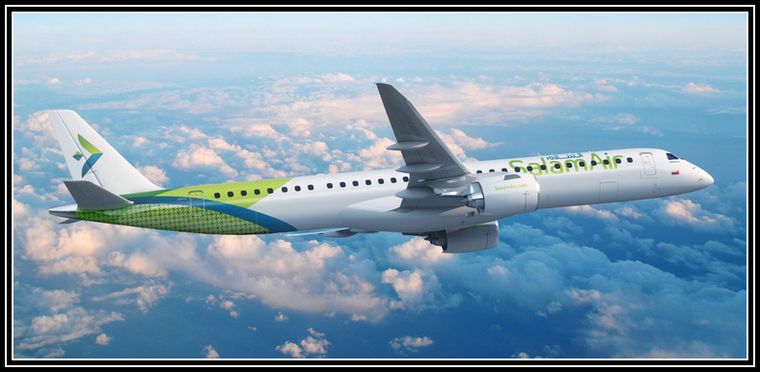
SalamAir has signed a firm order with Embraer S.A. ("Embraer") for six E195-E2, with purchase rights for a further six aircraft. The E195-E2, the quietest and most efficient aircraft in its class, will be delivered in a comfortable dual class configuration with 135 seats, beginning at the end of 2023. The deal, which will be added to the Q3 backlog, is valued at US$934.6 million, at list price with all options exercised.
The Muscat based low-cost carrier has opted for the E195-E2 to join and complement their all Airbus narrowbody fleet for the benefits and flexibility right-sizing provides; protecting yields while growing frequencies, and developing new markets and city pairs profitably.
Captain Mohamed Ahmed, CEO of SalamAir, said, "The aircraft will grow to be a core part of our fleet portfolio. It is exhilarating for us to be the first airline in the Middle East to fly the incredible E195-E2. Embraer's aircraft represents the best environmental efficiency, operating performance, and passenger comfort. The aircraft's sophisticated aerodynamics, novel wing design and new technologies enable its exceptional energy efficiency. These aircraft are perfect for the next frontier of our growth. They will allow the airline to open new local and regional cities and increase its frequency to these destinations due to its fuel efficiency and capacity, which suits the needs of these markets. The new fleet will be used on domestic flights initially, including the 4 oil fields and 4 international airports within Oman, as we receive more aircraft, we will be able to use them on regional airports in neighbouring countries which today are not connected to Oman.
Arjan Meijer, President and CEO Embraer Commercial Aviation, added, "It's great to be growing in the Middle East, a region that has often focused on long-haul travel. For Embraer it is also important to see a pioneering low-cost carrier like SalamAir recognise the value that E-Jets deliver in the LCC scenario, complementing larger narrowbodies to grow and maintain networks."
Google Banner Ad
SAN DIEGO INTERNATIONAL AIRPORT ACHIEVES HIGHEST RATING BY AIRPORT CARBON ACCREDITATION PROGRAM
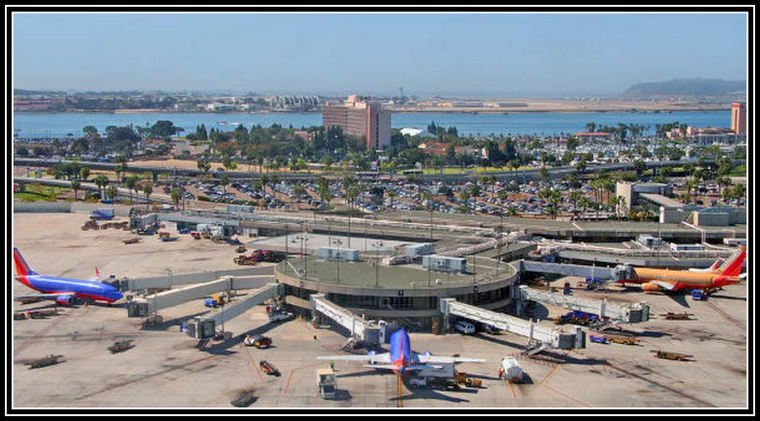
San Diego International Airport (SAN) has achieved the highest level of certification under the Airports Council International's Airport Carbon Accreditation (ACA) program - Level 4+ 'Transition.'
The airport achieved this certification through a series of programs that have increased the use of carbon-free electricity and all-electric vehicles, facilitated carbon-emission reductions by airline and rideshare partners and enabled carbon-offset purchases by our passengers, among other efforts.
Airport Carbon Accreditation is the only institutionally endorsed, global carbon management certification program for airports. It provides a common framework for active carbon management with measurable goalposts and then independently assesses and recognises the efforts of airports to manage and reduce carbon emissions through six levels of certification. Airport Carbon Accreditation is also the only global, airport-specific carbon standard that relies on internationally recognised methodologies.
SAN is one of only three North American airports to achieve Level 4+ 'Transition' certification and the only airport in California to reach this milestone. To achieve Level 4+, SAN has demonstrated that it continues to reduce carbon emissions under its direct control (i.e. emissions from building energy use and fleet vehicles), is on a trajectory to meet international Net Zero emission targets through implementation of its carbon management plan, has offset its remaining direct carbon emissions and has effectively partnered with tenants responsible for Scope 3 emissions at the airport.
"Since achieving Level 3+ 'Carbon Neutrality' in 2018, our team has been working with our airline partners, ground transportation providers and passengers to reduce their emissions which is a key component of achieving Level 4+ accreditation," said Kimberly Becker, San Diego County Regional Airport Authority, President and CEO. "It's through collaboration that this goal was met and I would like to acknowledge the hard work of the Airport Authority team and the aviation partners that are committing to new ways of reducing emissions."
Some of the notable projects and initiatives SAN has successfully implemented that contributed to achieving Level 4+ include:
The Airport Authority was one of the first organisations to enrol in San Diego Community Power's "Power100 Champions" program and now receives 100 percent renewable and carbon-free grid-delivered electricity to the entire SAN airport campus.
Transportation Network Companies (Uber, Lyft, etc.) conducting ridesharing services at SAN must meet an average fleetwide Greenhouse Gas Rating equivalent to the fuel efficiency of at least 52 miles per gallon by 2025.
In 2015, the Airport Authority developed and launched The Good Traveller, a carbon offsetting program designed to encourage sustainable travel by enabling individuals to offset the environmental impact of their journey in an affordable, easy, and meaningful way.
Through its stormwater capture and reuse system at Terminal 2 Parking Plaza, SAN has captured, treated, and reused more than four million gallons since the system was commissioned in 2018. In 2020, the North side Storm water Capture Cistern was completed and is designed to reuse approximately 16 million gallons annually with plans to use the captured water to wash cars at the Rental Car Center.
The Airport Authority has developed one of the largest zero-emission shuttle fleets in the region, with a total of 33 all-electric buses. These cleaner and quieter buses transport passengers between terminals, employees to remote parking lots, and transit riders between the Old Town Transit Center and the airport.
SAN has partnered with airports, airlines, sustainable aviation fuel (SAF) producers, and other stakeholders to advocate for policies that would increase the use of low-carbon SAF to reduce greenhouse gas emissions in the aviation sector.
The Airport Authority is working with our aviation partners to convert ground support equipment (GSE) to use lower-carbon alternative fuels. Airlines are expected to transition approximately 80 percent of their GSE to electric and renewable diesel by 2024.
To learn about other environmental goals and initiatives being done at the airport as well as how the Airport Authority is leading efforts in environmental, social and economic stewardship. Please visit sustain.san.org which is the Airport Authority's Sustainability Report.
Google Block Ad
VIRGIN ATLANTIC TO JOIN SKYTEAM ALLIANCE
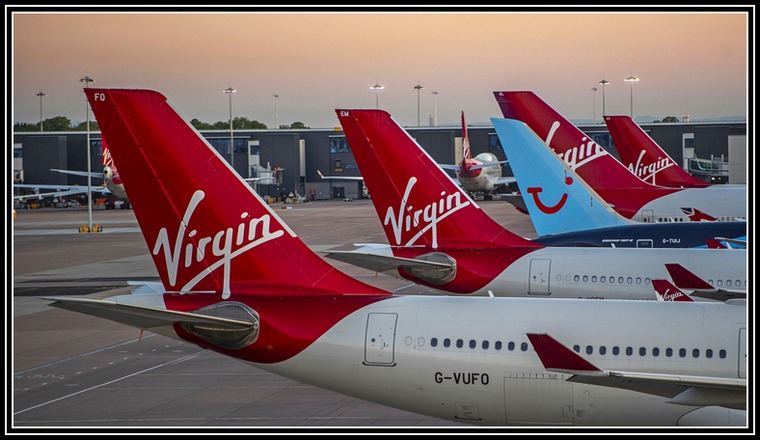
SkyTeam, the global airline alliance, and Virgin Atlantic have today announced that the UK airline will join as SkyTeam's newest member in early 2023. Virgin Atlantic will become SkyTeam's first and only UK member airline, enhancing the alliance's transatlantic network and services to and from Heathrow and Manchester Airport.
Virgin Atlantic customers will benefit from a consistent, seamless customer experience, across 1,000+ global destinations. They'll also have more opportunities to earn and redeem points across member airlines and access to a network of 750+ airport lounges, spanning six continents.
The airline's Flying Club members will enjoy significant benefits from the day of joining, with a global expansion of its loyalty offering. Virgin Atlantic Silver Card holders will be recognised as SkyTeam Elite Members, whilst the airline's Gold Card members will become Elite Plus. This recognition provides a raft of benefits, including priority check in, baggage handling and boarding. Flying Club members will be able to take advantage of the benefits as soon as Virgin Atlantic officially enrols in SkyTeam, which is expected in early 2023.
Virgin Atlantic's entry into the alliance builds upon the success of its transatlantic joint venture partnership with Delta Air Lines and Air France-KLM, each already long established SkyTeam members. The four partners are co-located at London Heathrow's Terminal Three, alongside existing SkyTeam members Aeromexico and China Eastern, providing customers with smooth airside transits and the most convenient connection times possible.
Shai Weiss, CEO Virgin Atlantic, commented, "At Virgin Atlantic we strive to create thoughtful experiences that feel different for our customers and SkyTeam shares that customer first ethos. 2022 marks the year Virgin Atlantic gets back to its best for our customers and people and joining SkyTeam is an important milestone. Our membership will allow us to enhance established relationships with our valued partners at Delta and Air France-KLM, as well as opening up opportunities to collaborate with new airlines. It will enable a seamless customer experience, with an expanded network and maximised loyalty benefits."
Kristin Colvile, SkyTeam CEO, said, "As a member of SkyTeam, Virgin Atlantic will benefit from increased opportunities to expand its global network through partnerships and synergies: customers will have more ways to earn and burn miles while enjoying the service for which Virgin Atlantic are renowned. Virgin Atlantic shares SkyTeam's values, caring for our customers, our employees and the world in which they live and we are excited to have them as part of the SkyTeam family."
Codeshare agreements are already in place with Aeromexico and Middle East Airlines with options for more codeshares to follow. Interline agreements with all SkyTeam members are already in place, providing one touch point for all customers, creating a seamless journey on one ticket.
Virgin Atlantic flies to 12 destinations throughout the USA in partnership with Delta and Air France-KLM including New York, Los Angeles, Miami and San Francisco. In May the airline launched a brand-new service to Austin, Texas and will start daily flights to Tampa, Florida from November. Virgin Atlantic also operates an extensive Caribbean portfolio including Antigua, Barbados, Jamaica and The Bahamas. Virgin Atlantic also operates services to Greater China, India, Israel, Nigeria, Pakistan and South Africa.
SkyTeam members, Delta, Air France and KLM are already collocated at Virgin Atlantic's home base at London Heathrow Terminal 3. Virgin Atlantic operates long-haul services from UK regional airports including Edinburgh and Manchester. The airline offers a comprehensive network to North America and the Caribbean in partnership with Delta Air Lines, Air France and KLM and also operates services to Greater China, Israel, Nigeria, Pakistan and South Africa.
SkyTeam is dedicated to powering a seamless customer journey, with all members working together to connect millions of passengers across an extensive global network. The members are Aeroflot (suspended), Aerolineas Argentinas, Aeromexico, Air Europa, Air France, China Airlines, China Eastern, Czech Airlines, Delta Air Lines, Garuda Indonesia, ITA Airways, Kenya Airways, KLM Royal Dutch Airlines, Korean Air, Middle East Airlines, Saudia, TAROM, Vietnam Airlines and XiamenAir.
Google Banner Ad

|
                        |























